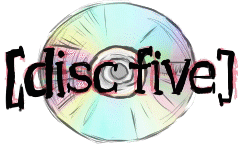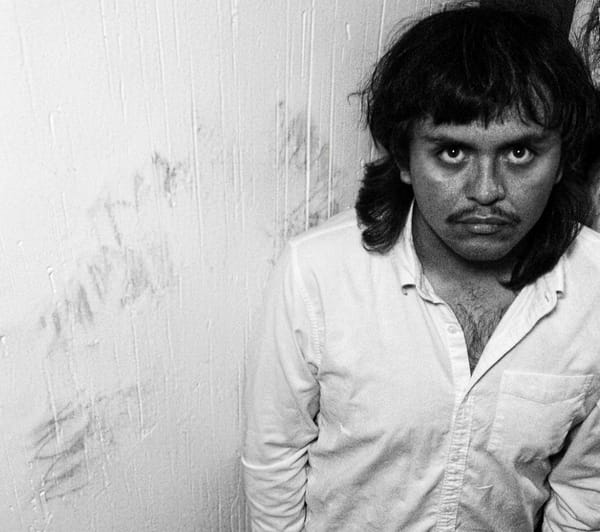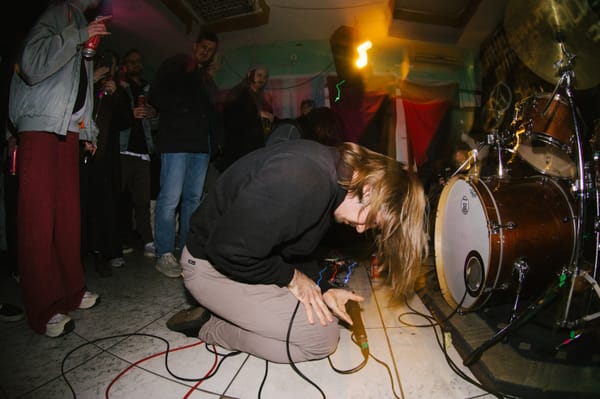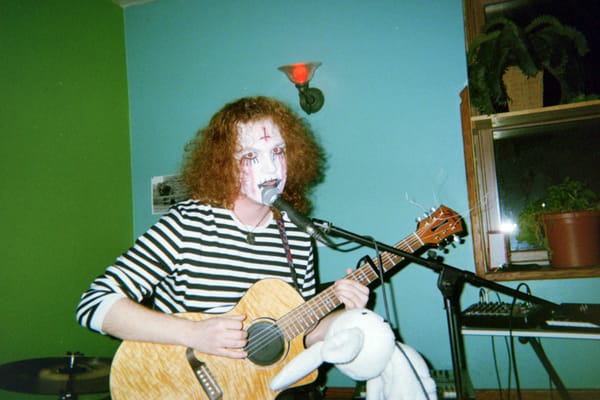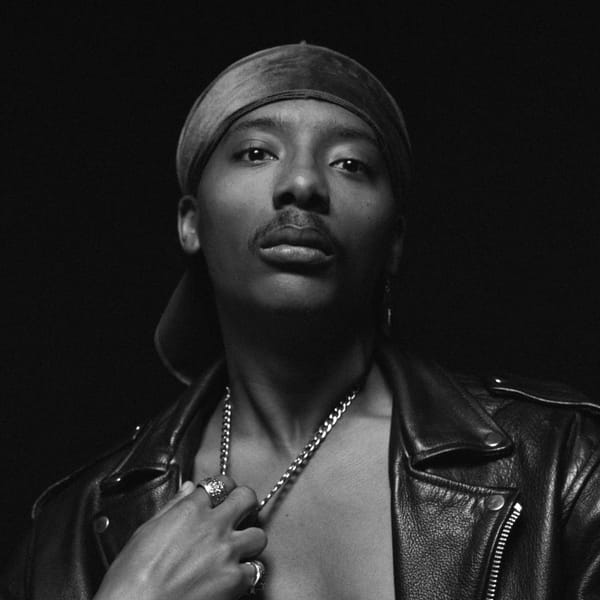I'm just redneck as shit: Analog Boy discuss queer country and their new album, Imaginal Discs
"I'm here, I'm queer, I like guns, big old trucks, and beer." Analog Boy is here to talk queer country music, the beauty of cassette tapes, and the wonders of the Holometabolous insect. Read on and listen to Imaginal Discs, (or), songs about the moon and other such ephemeral things.
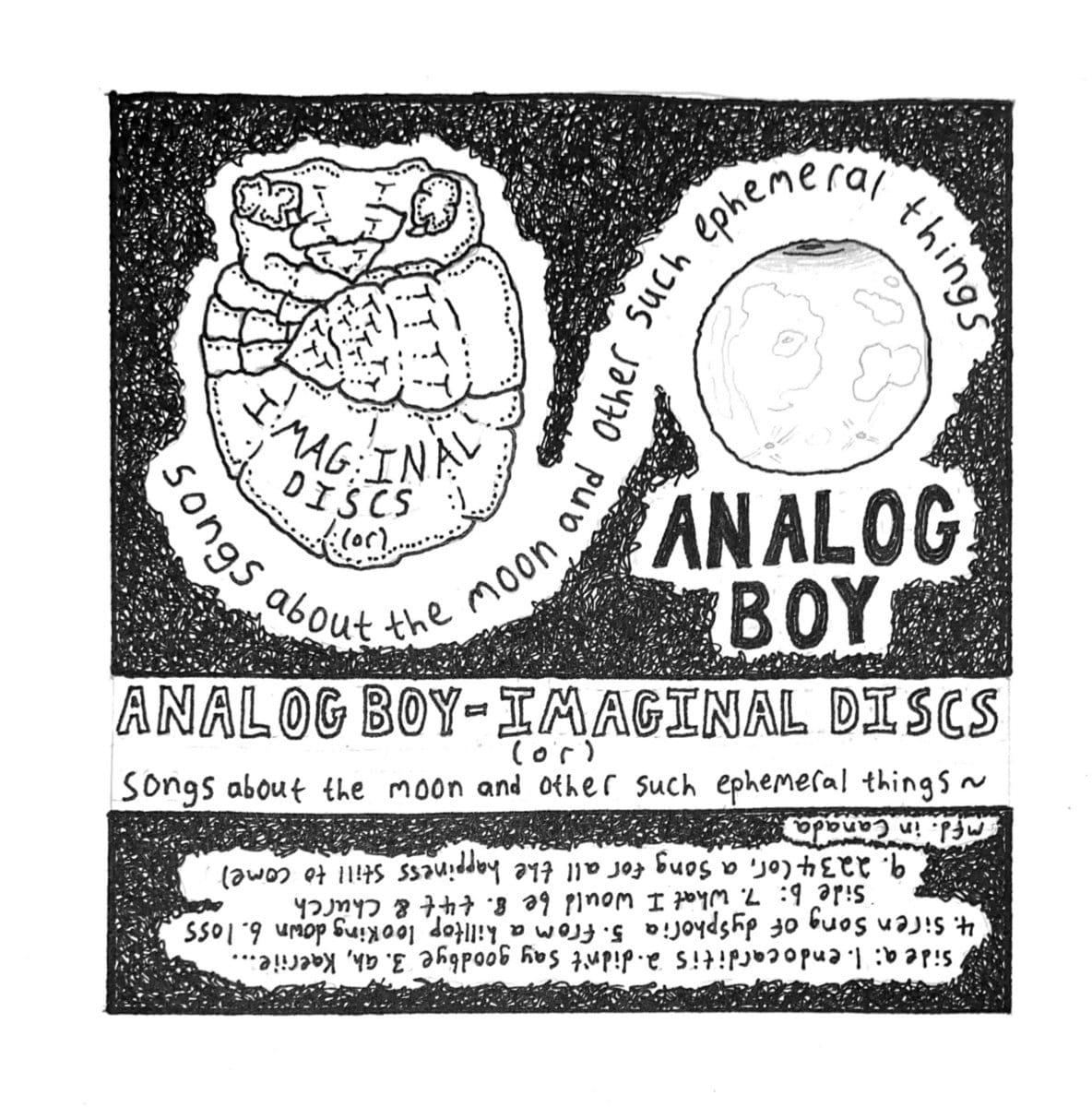
Imagine sitting under the night sky on a hot summer night. In the distance, you hear cheerful whoops and hollers - your neighbors must be throwing a bonfire or something. But alone you sit on your hill, serene and reflective. You twiddle the grass between your fingers. You gaze down at the church house. Eventually, your neighbors go back inside. It’s quiet. It’s just you and the moon now.
The latest album from Analog Boy, Imaginal Discs, (or), songs about the moon and other such ephemeral things, is the soundtrack for nights like those. Banjo strums and lilting violins play as Riley Mononym croons about dishwasher blues, sobriety, dysphoria, and Southern summers.
There's something very soothing within the album's melancholy. ("Soothing melancholy" is what really makes a country album great, I think.) Painful as the subject matter may be, Analog Boy maintains that pain is something to be honored and shared with those you love - "pain has much weight, but we can share the load." And even when there’s no one else around, the moon watches over you.
“I was having a weird time in the spring of 2020, like probably all of us were, and I just started writing some songs,” Riley tells me over Zoom. “I recorded a couple of them on a shitty little one mic set up inside a sugar house in Wardsboro, Vermont. And I said, ‘hey, well, that was kind of fun!’” Later that year, she grabbed a four-track and recorded Analog Boy’s first album, "sobering songs for drunken times".
In the Bandcamp liner notes for Imaginal Discs, the album is cheekily listed as “recorded in studio imperfection on a hill in Vermont.” Like most of the music I cover here, the Analog Boy albums are home recordings that may not be technically perfect. And, like the other albums I cover, this doesn’t really impede on the listening experience.
While the first album was done entirely by Riley, Imaginal Discs was mixed and mastered by Dropout Wife (aka Alexa). The two met at a show in Battleboro, and eventually began performing together at open mics. Alexa also joined us on the Zoom call, and she sheds some light on how to adjust to analog if you've only ever worked with digital recording.
Riley and Alexa were kind enough to do this interview with me, and it was a lovely chat - in fact, it was so lovely that we went well over Zoom's free call limit, and I had to quickly open up a new room so that we could keep talking about country music, mandocello, and bugs.
So, you recorded this in the house you're in now?
RILEY: It was right here on this couch.
ALEXA: Literally, right here.
Oh, a true behind the scenes look. That’s kind of magical… So, Alexa, can you tell me about what it was like using the four-track?
ALEXA: Well, I had some experience doing some self-produced stuff, ranging from GarageBand to some more complicated digital audio workstations. But I’ve always been interested in analog, and so, when I met Riley and I saw the four-track, I was really interested.
ALEXA: Didn't know how it all worked, but! I learned that in many ways, it's literally just a physical form of what these DAWs give you - those actually show you a little graphic that looks like what a four-track looks like. It was pretty simple to translate to, but there's also ways that it was challenging. It's not like a digital audio workstation where you can just like, click, go back there, click, and make fine points. I kind of love when you're put into a limiting situation.
You did some of the instrumentation on this album as well, right?
ALEXA: Yeah, I've played all of these songs live in different ways with different instruments. But in terms of what's recorded, I played the mandocello on “t4t and church…”
RILEY: Which is an instrument she literally doesn't play!
ALEXA: Well, it's a stringed instrument with frets, so I could figure it out.
RILEY: You played it great!
ALEXA: …and then I played the bass on the last song, “2234 (or, a song for all the happiness still to come).”
So you hadn't played the mandocello prior to this?
ALEXA: Nope.
RILEY: You had like, maybe two days of practice with it.
ALEXA: I'm very comfortable with guitar and bass, and the difference with mandocello… It's like mandolin in the sense that you have to deal with having double strings, which I've done with a 12-string guitar. You just gotta adjust to that. So it's not like I just picked up the trumpet and started playing the trumpet. I could not do that. But it was definitely challenging.
What are your live shows like? Are you performing this album together or doing other stuff?
RILEY: We've been doing stuff off of both albums and some of my other material that isn't currently recorded. Sometimes we play some covers, and sometimes we do improvisational stuff. Alexa writes some really interesting guitar parts, and so sometimes we'll just jam on some weird chord progression, some jazzy stuff that she feels like playing.
ALEXA: The thing is that with four-track, really you're kind of performing live in the recording already.
Riley, what drew you to bluegrass / country / folk music?
RILEY: In large part it's some of the formative music I was listening to when I was first learning to play. I taught myself banjo when I was sixteen, and at the time I was really into the band Ramshackle Glory, so that was a big influence on me. Douglas Fur played clawhammer style banjo on Ramshackle Glory's first album, and then Nick Berger played accordion on that album, but had solo stuff playing clawhammer style banjo. And so I listened to a lot of that solo stuff and was like, “this is really good.”
RILEY: I learned a lot of right hand technique from watching them play live, and also just from really listening to and trying to replicate their recordings. Country and western makes up a huge portion of my personal listening, so really, it's just because that's what I listen to, and banjo is an instrument that I have so much fun playing.
RILEY: For the first album, the idea I had at first was like, “I'm gonna make a country album.” I don't think it really quite came out that way. I think you can identify the influence, but… I don't know what you’d call it, really. But definitely on the second album, I was like, “alright, I want to really focus on banjo driven tunes.”
Did you go to a lot of bluegrass concerts or things like that when you were younger? To see the banjo live?
RILEY: By the time I was a teenager, I was looking for people who were playing these instruments that I was interested in learning. And so I did wind up going to folk festivals and other music festivals. Maybe not playing bluegrass, but at least where there are people playing banjo, mandolin, acoustic flat picking guitar - these sort of things that I was interested in learning. And I did learn a lot, especially as a teenager, from being exposed to people who were doing that stuff at concerts.
Country is still kind of a big oversight for me. Recently, I got into Lucinda Williams. And I like Emmylou Harris.
RILEY: Oh, Emmylou Harris is a classic.
But it's funny because if I mention, like, “oh, I've been listening to more country lately,” people will kind of…grimace.
RILEY: I know exactly what you're talking about. I sometimes do get that response. And the thing is, when I get that, I just double down on it because I'm just redneck as shit. Like, I'm here, I'm queer, I like guns, big old trucks, and beer. That's just what it is. I listen to country and western music.
There was a book I read not that long ago called Real Queer America by Samantha Allen. And part of her mission was to dispel this idea that there aren't any queer people in the Southern US. I think people literally don’t realize that; or at the very least, they forget.
RILEY: Yeah, I think they do. And I mean, I know it from lived experience. I spent time living in Virginia and traveling through the South. One of my best friends I met at a queer compound outside of Atlanta, Georgia, and that's just what it was - a bunch of trans people living together, all hanging out, shooting guns in their backyard. I was like, “this is my kind of crowd.” While my music is very inspired by country and western, it's also very inspired by my own queer trans identity. It's just about putting out into the world the kind of music that I wanted to listen to, and trying to be the kind of person who I want to see in the communities that I live in.
RILEY: I mean, there's definitely problems in the genre, don't get me wrong. there are a lot of problematic artists and associations with the unsavory aspects of white American culture, which is oftentimes transphobic, oftentimes racist. But what country music is really about is open to interpretation and reinterpretation.
I wanted to ask you about another aspect of the album - in the liner notes, you wrote “thanks to the moon for all her inspiration in my life." Would you mind telling me more about you and the moon?
RILEY: I think that the moon is beautiful. I like spending a lot of time outdoors, and I like spending time outdoors at night. I've learned to tell time by the moon, and spent a lot of time watching the cycles of it. Especially right before I wrote “2234,” which is the last song on the second album. I stood out and I watched the partial lunar eclipse that was visible here at 22:34 hours, or 10:34pm.
RILEY: I've got the moon tattooed on my neck. There's just something about the heavenly bodies and the night sky. It really speaks to me. It wasn't really on purpose, but I found that the moon kept coming up as a theme in the lyrics that I was writing. It's there in “from a hilltop looking down,” which was the first song that I wrote chronologically on this album. And then by the time I was writing "2234", I was kind of like, “okay, I'm going for a theme here.”
Did you do the artwork for the album?
RILEY: Yeah, I drew that myself. I can show you.
Oh hell yeah. So I get to see the couch this was recorded on, and I get to see the sketch of the album. This is what it's all about.
RILEY: I'll be honest with you. I was kind of under-inspired on the album art, and Alexa kept telling me, “you gotta make it look cool, people aren't gonna listen to this if it doesn't.”
ALEXA: Look, I didn't say it like that…
ALEXA: …but that was kind of what I was saying. I was like, “do something hand drawn!”
RILEY: I just really wanted to be done with it. I got it done in probably two hours, with a bunch of cigarette breaks.
ALEXA: I don't know if everyone notices when they look at the album art because I'm a cassette noob, but it's drawn out to be the paper art to be put into a cassette box.
RILEY: Yeah, I'm getting cassettes pressed of this album. The names of all of the songs are upside down because you're gonna fold over that card to be the J card going in a cassette.
Are you pressing them yourself?
RILEY: No, I go through duplication.ca. It's not very expensive. They'll print professional quality J cards and custom cut the length of the tapes for you, and it's way easier. It's all recorded and mastered to cassette, so I could copy it, but I'd have to do them one at a time and I'm just not sure I have the mental fortitude for that. As much as I love the do-it-yourself ethic, I didn't want to spend however-long-it-is pressing out individual copies of this record.
ALEXA: Do some of it yourself.
RILEY: Not the annoying parts.
There are always things that I don't even think to ask when it comes to interviews. Is there anything about Analog Boy that you want the world to know?
RILEY: I'm just going to throw this one out there - I was shit faced when I recorded the whole first album, and I got sober while I was in the mixing and mastering process of it. And I am so much better off now that I don't drink alcohol anymore. It was super weird to go through that process and to have one album from before and another from after.
RILEY: I've been really inspired by sober bands and bands that have people in them who are talking about their relationship with drugs and alcohol. I've had a very complicated relationship with those things in my life. I think that if you're listening carefully and you know what you're listening for, it definitely comes through in my music.
RILEY: I just want to say that I’m grateful for the support of everyone who's helped me to get my shit together and get sober. And I'm grateful that there's been other music out there in that theme - music about sobriety and about getting sober.
Are there any albums in particular?
RILEY: This City Isn't Big Enough by Apes of the State and Live the Dream by Ramshackle Glory. Both of those were definitely influential to me. I would say both of those are in the theme of what I'm talking about - music about substance use and about improving your life by changing your relationship with drugs.
ALEXA: Oh, also. I feel like you gotta bring up what imaginal discs are.
Oh yeah! Please tell me.
RILEY: Alright...
RILEY: Holometabolous insects are the class of insects which undergo complete metamorphosis, meaning that they have a life stage as a larva and then a separate and distinct life stage as a pupa. And during the process of pupation, adult forms develop which were not externally present at the larval stage. That's also why the holometabolous insects are referred to as Endopterygota, meaning internal development of the wings. The wings originally start as these small folds of tissue inside of the larva. Same with the adult legs. The holometabolous insects are a vermiform or worm-like larva. And so the wings, the legs, the genitals, and a number of other adult body parts start as these folds of tissue, and those are the imaginal discs.
RILEY: There's really no reason that that's the title of the album other than I like holometabolous insects. The album art is derived from...it's actually from this textbook right here. This is an introductory entomology textbook, and one of the illustrations is the embryonic development of a scorpion fly, which is what that drawing was based from.
ALEXA: It's not directly related, but I can think of very interesting poetic metaphors and imagery with it. I kind of love that it's depicted on the cover, even though it's got a kind of mysterious meaning.
ALEXA: And, you know, another quick thing. I'm coming in as someone playing with Riley, and being a part of Analog Boy and playing music together…I just feel very fortunate for it. I remember I heard Riley's first album and I loved it. For me, it felt like being like a fan of someone's music and then starting to play with the person you're fan of. It's been really fun and beautiful and interesting and challenging.
RILEY: I was really blown away when I met Alexa and how she expressed so much interest in my music - which had just been a solo project for so long, I never really consistently played with another person. I think it's cool as fuck that someone else has shown this kind of interest in what I've been making. It's been a great pleasure to be able to share it with her.
Support Analog Boy on Bandcamp, and check out those cassette tapes. You can follow them over on Instagram, and they have a website here, too :3
